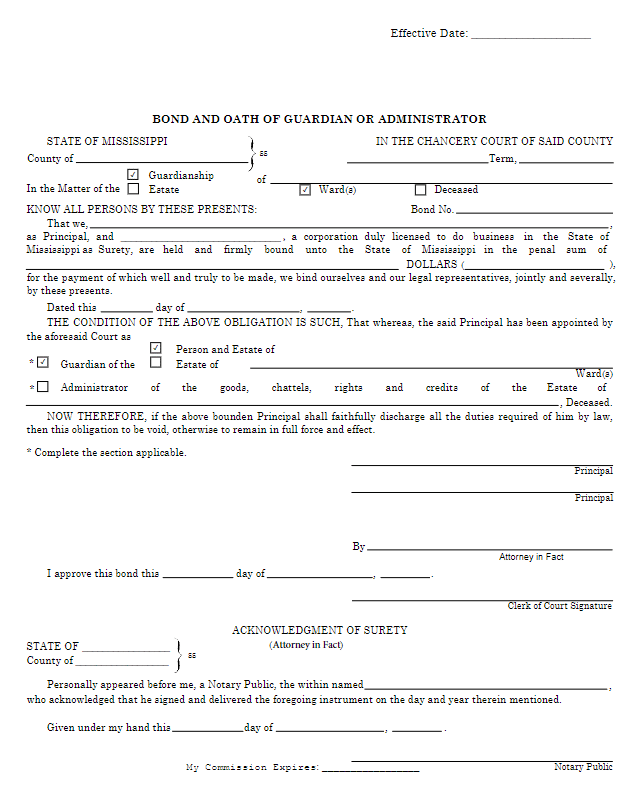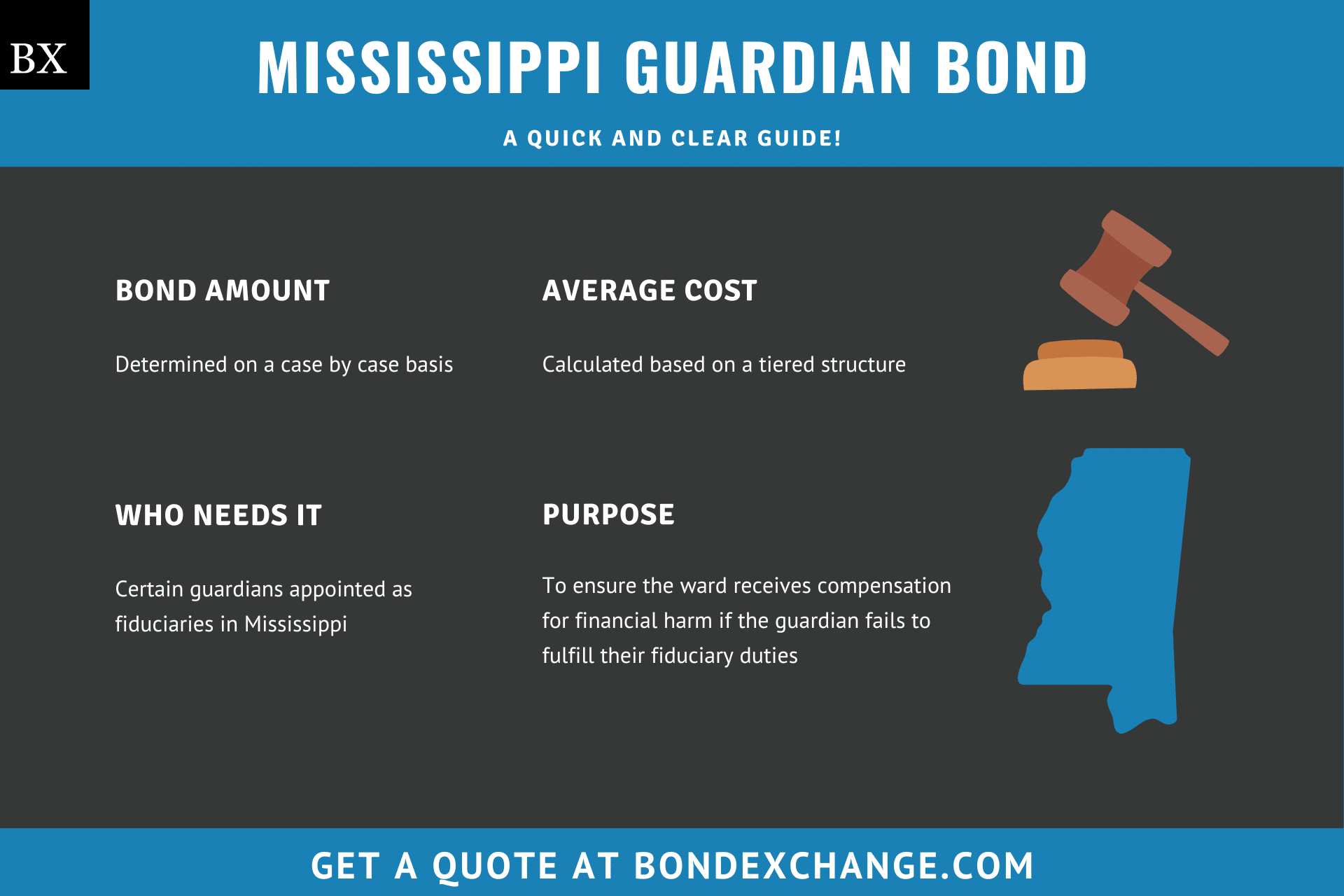Mississippi Guardian Bond: A Comprehensive Guide
This guide provides information for insurance agents to help their customers obtain a Mississippi Guardian bond.
At a Glance:
- Average Cost: Calculated based on a tiered structure
- Bond Amount: Determined on a case-by-case basis
- Who Needs It: Certain guardians appointed as fiduciaries in Mississippi
- Purpose: To ensure the ward receives compensation for financial harm if the guardian fails to fulfill their fiduciary duties
- Who Regulates Guardian Bonds in Mississippi: The chancery court with jurisdiction over where the ward resides or has property

Background
Mississippi Code 93-20-201 and 93-20-301 require all guardians to be appointed by a court and swear an oath before assuming their fiduciary duties. The Mississippi legislature enacted the appointment requirement to ensure guardians act in the ward’s best interests when making decisions related to their health and welfare. To provide financial security for the enforcement of this requirement, certain guardians must purchase and maintain a probate surety bond before becoming appointed as a fiduciary.
What is the Purpose of the Mississippi Guardian Bond?
Mississippi requires certain guardians to purchase a surety bond as a prerequisite to being appointed as a fiduciary over a ward’s estate. The bond ensures that the ward will receive compensation for financial harm if the guardian fails to abide by the regulations outlined in Mississippi Code 93-13-17. Specifically, the bond protects the individual if the guardian fails to adhere to all court orders or mishandles the ward’s assets.
For example, if a guardian uses money from the ward’s bank account to pay for unauthorized expenses or mixes the estate’s funds with their own, the ward can file a claim against the guardian’s bond to recoup their losses. In short, the bond is a type of insurance that protects the individual if the guardian does not fulfill their fiduciary duties.
How Can an Insurance Agent Obtain a Mississippi Guardian Bond?
BondExchange makes obtaining a Mississippi Guardian bond easy. Simply log-in to your account and use our keyword search to find the “Guardian” bond in our database. Don’t have a login? Gain access now and let us help you satisfy your customers’ needs. Our friendly underwriting staff is available by phone (800) 438-1162, email or chat from 7:30 AM to 7:00 PM EST to assist you.
At BondExchange, our 40 years of experience, leading technology, and access to markets ensures that we have the knowledge and resources to provide your clients with fast and friendly service whether obtaining quotes or issuing bonds.
Not an agent? Then let us pair you with one!

Click the above image to find a BX Agent near you
What are the Underwriting Requirements for the Mississippi Guardian Bond?
Most surety companies will examine the following factors when determining eligibility for the Mississippi Guardian bond:
- Guardian’s credit history
- Whether or not the estate has an attorney
- Whether or not the guardian is a family member
- The guardian’s occupation
- Whether or not the guardian is replacing a prior fiduciary
- If the guardian has ever committed a felony
- Whether or not there is any ongoing business in the estate
- If a creditor is requiring the bond
- If the bond amount is greater than or equal to the estate’s value
How Much Does the Mississippi Guardian Bond Cost?
Surety companies typically determine the premium rate for Guardian bonds based on a tiered structure, so larger bond amounts will be charged a lower premium rate than smaller bonds.
The following table illustrates the pricing structure for the Mississippi Guardian bond:
$1,500,000 Guardian Bond Cost
| Bond Amount | Premium Rate | Total Bond Cost |
|---|---|---|
| First $20,000 | 0.75% | $150 |
| Next $40,000 | 0.60% | $240 |
| Next $140,000 | 0.50% | $700 |
| Next $300,000 | 0.375% | $1,125 |
| Next $1,000,000 | 0.25% | $2,500 |
| Total cost of $4,715 |
Who is Required to Purchase the Bond?
Mississippi requires certain guardians to purchase a surety bond as a prerequisite to becoming a court-appointed fiduciary. To paraphrase Mississippi Code 93-20-102, a “guardian” is a person appointed as a fiduciary who is responsible for providing care and protection to a ward. Likewise, a “ward” is defined as a minor or adult for whom a guardian has been appointed that is incapable of making sound decisions concerning their health and safety. In Mississippi, a minor is an unemancipated individual under the age of 21 years while an adult is an individual at least 21 years old or an emancipated individual under the age of 21 years.
Mississippi Code 93-13-17 dictates that the chancery court has the authority to determine if a guardian must purchase a bond and will require a bond on a case-by-case basis. Guardians will not be required to purchase a bond in the following situations:
- A person with the power to nominate a guardian in a will waives the bond requirement
- The guardian deposits a portion or all of the ward’s assets into an FDIC-insured financial institution subject to prior court approval for release

How do Mississippi Guardians Become Appointed as Fiduciaries?
Guardians in Mississippi must navigate several steps to become appointed as fiduciaries. Below are the general guidelines, but appointees should refer to the appointment statutes or the Mississippi Court’s website for details on the process.
Guardians of a Minor
Step 1 – Hire an Attorney
Although not explicitly required, it is highly recommended that guardians hire an attorney to assist with the guardianship process.
Step 2 – Determine Priority
In guardianship cases over a minor, the court will appoint the nominee of the minor’s parents unless the court determines the appointment goes against the minor’s best interests. If the court does not appoint the parent’s nominee, it will consider the person nominated by the minor if the minor is at least 14 years old.
If the court determines that both the minor’s nominee and the parent’s nominee are not suitable for guardianship, the court will appoint a person they deem to be in the best interest of the minor.
Step 3 – File a Petition for Appointment
Persons seeking guardianship over a minor must file a petition for appointment with the chancery court in the county where the minor resides or owns property. Any person interested in the welfare of a minor may petition the court to begin protective proceedings. Petitioners can obtain the necessary forms from the court, and must include the following information:
-
- The name and address of any attorney for the parents of the minor
- Personal information about the person seeking the appointment
- General statement and evaluation of the proposed ward’s property
- The reasoning for why guardianship is necessary
- Any additional information requested by the court
Step 4 – Notify the Appropriate Parties
After submitting the required items to the court, petitioners must notify all of the interested persons listed in the petition. The notice must include a notice of the hearing and a copy of the petition and must be given to all of the following parties:
-
- The minor, if they are at least 14 years old
- Each parent of the minor, if applicable, or the adult nearest in kinship
- Any adult with whom the minor resides
- Each individual who had primary care or custody of the minor for at least 60 days during the six months immediately preceding the filing of the petition
- Any other person the court determines is necessary
Step 5 – Attend a Hearing
Guardians must attend a hearing conducted by the court and present evidence as to why the minor is in need of guardianship. The court will examine the evidence presented by the guardian as well as that presented by the minor being evaluated (if any) and make a determination as to whether or not guardianship is necessary.
Any interested person can apply to the court to participate in the hearing. If the court finds a basis for the appointment, it will determine the type of guardianship necessary and issue a letter of guardianship to the petitioner.
Step 6 – Purchase a Surety Bond
Unless otherwise exempt, guardians must purchase and maintain a surety bond.
Guardians of an Adult
Step 1 – Hire an Attorney
Although not explicitly required, it is highly recommended that guardians hire an attorney to assist with the guardianship process.
Step 2 – Meet the Qualifications
Persons are ineligible for appointment as a guardian if they are a person that provides paid services to the ward or if they are an employee or relative of an individual who provides paid services to the ward. An owner, operator, or employee of a long-term care facility that provides care to the ward is also ineligible for appointment unless they are related to the ward by blood, marriage, or adoption.
When considering who to appoint as guardian, the chancery court will consider the following factors:
-
- The person’s relationship to the ward
- The expressed wishes of the ward
- The likelihood that the person would fulfill their duties as guardian
- The extent to which the person and the ward have similar values and preferences
The court will act in the best interests of the ward and may choose to decline someone petitioning for appointment if they believe that the appointment would be detrimental to the ward. If no qualified person can be appointed, the court may appoint the clerk of the chancery court as guardian.
Step 3 – File a Petition for Appointment
Persons seeking guardianship over an adult must file a petition for appointment with the chancery court in the county where the adult resides or owns property. Petitioners can obtain the necessary forms from the court, and must ensure they complete the form in its entirety to avoid delays in the proceedings.
Any person interested in the adult’s estate, any relative or friend of the adult, the adult for whom guardianship is sought, and the clerk of the chancery court may petition the court to begin protective proceedings over an adult.
Step 4 – Attend a Hearing
Guardians must attend a hearing conducted by the court and present evidence as to why the adult is in need of guardianship. The court will examine the evidence presented by the guardian as well as that presented by the adult being evaluated (if any) and make a determination as to whether or not guardianship is necessary.
Any interested person can apply to the court to participate in the hearing. If the court finds a basis for the appointment, it will determine the type of guardianship necessary and issue a letter of guardianship to the petitioner.
Step 5 – Purchase a Surety Bond
Unless otherwise exempt, guardians must purchase and maintain a surety bond.
How do Mississippi Guardians File Their Bonds?
Guardians should file their completed bond forms, including the power of attorney, to the clerk of the chancery court of the county where the ward resides or owns property.
The surety bond requires signatures from the surety company that issues the bond, the applicant, and a notary public. The surety company should include the following information on the bond form:
- Legal name, address, and telephone number of the entity/individual(s) buying the bond
- Legal name, address, and telephone number of the ward’s attorney
- Surety company’s legal name, address, and telephone number
- Type of fiduciary relationship
- Date the bond is signed
- Bond amount
What can Mississippi Guardians do to Avoid Claims Made Against Their Bonds?
To avoid claims against their bonds, guardians in Mississippi must ensure that they:
- Perform all of their fiduciary duties
- Obey all court orders
- Do not mismanage the estate’s property
- Obtain court approval before using any of the estate’s funds
